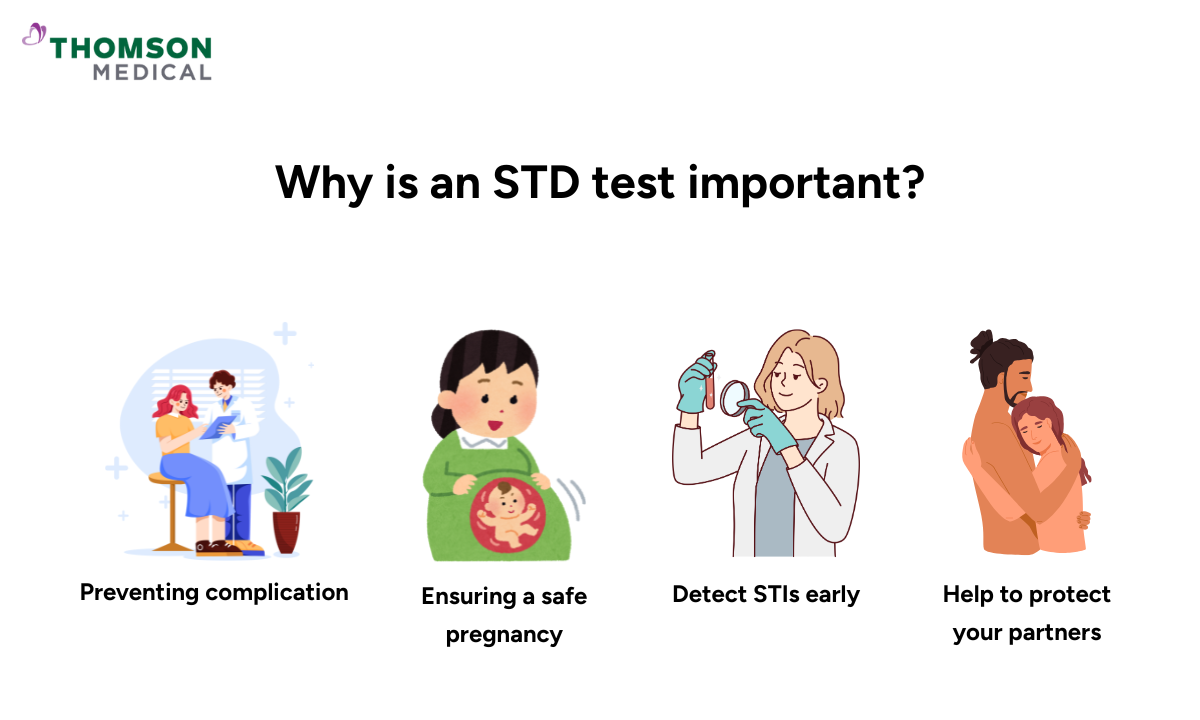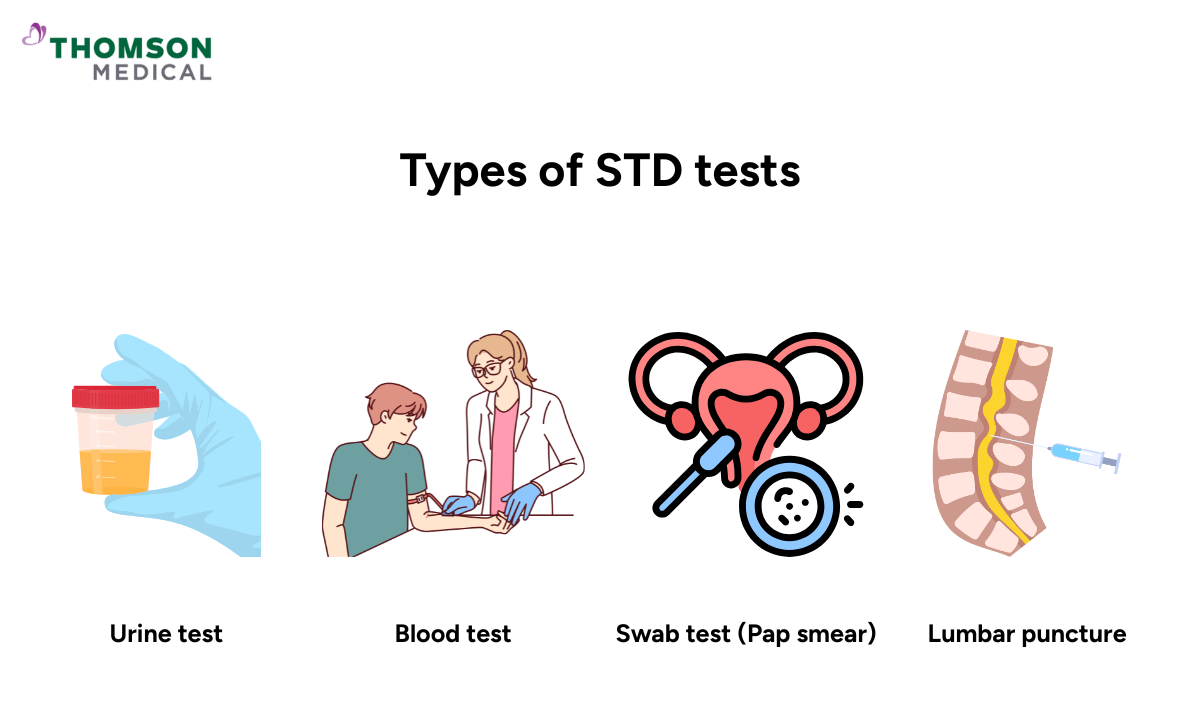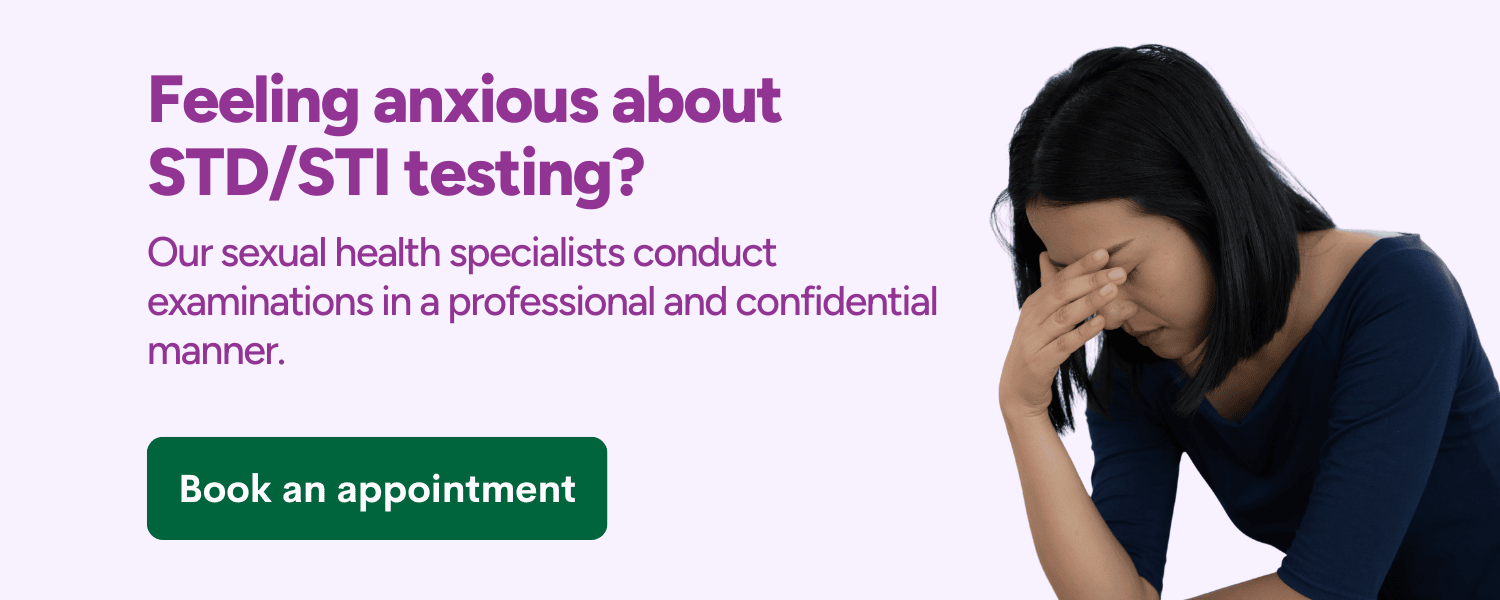To be totally honest, sexually transmitted diseases (STDs) are still considered as taboo in this day and age, and it may cause you to feel embarrassed or worried that others might judge you when coming to a clinic for an STD Test. However, many sexually transmitted infections (STIs) do not cause noticeable symptoms in the early stages, this may put you and your partner at risk.
If you are sexually active or have multiple partners, the responsible choice is to get tested for STDs regularly.
Why is an STD test important?

Taking an STD test is necessary for early treatment and helps stop a sexually transmitted infection (STI) from developing into an STD. For example, it can help to catch conditions such as human papillomavirus (HPV) before they show any symptoms, or even worse, develop into cancer. It also prevents those who have it from unknowingly passing it on to their partners.
Here are some other reasons why STD testing and screening are important:
Help protect others:
Knowing your status can help protect others. If you test positive for an STI, you can take steps to prevent passing it on to your partners – and inform them so they can get tested and treated too.
Preventing complications:
Untreated STIs can lead to serious long-term health problems, including infertility and chronic pain, as well as an increased risk of contracting HIV.
So an STD test can help prevent these complications by treating the condition early and improving your chances of a full recovery.
Peace of mind:
Regular testing can ease your worries and assure you of your sexual health, which is vital to your well-being.
Ensuring a healthy pregnancy:
An untreated STI during pregnancy can pose serious health risks to both mother and baby. Testing allows early intervention so that treatment can be started to protect them both.
The testing process is generally straightforward and usually involves urine tests, blood tests, swab tests, and lumbar puncture.
How do I know if I need to get an STD test?
In general, STD testing is recommended for you in the following situations:
If you currently have HIV
If you are sexually active, especially with multiple partners
If you have had a sexual relationship with someone who has tested positive for an STI
If you experiencing symptoms such as unusual discharge, sores, pelvic pain, painful urination, or a burning sensation in the genital area
If you are sexually active, it is recommended that you take an STI test every 3 to 6 months. Pregnant women should also be tested to prevent possible transmission of infection to their baby during pregnancy or childbirth.
Our sexual health doctor
Loading...
Common types of STDs and their symptoms
While many STDs can be asymptomatic, knowing what to look out for can help with early detection and treatment. Below are the most common STDs, their typical symptoms, and the available treatments:
| STD | Symptoms | Is this STD curable? |
|---|---|---|
Chlamydia | Pain during urination, abnormal discharge from the genital, pelvic pain, and pain and swelling in one or both testicles in men. | Yes, Chlamydia is treatable with antibiotics. |
Gonorrhoea | Burning sensation during urination, abnormal discharge from the genital, pelvic pain, and rectal soreness. | Yes, Gonorrhoea is typically treated with antibiotics |
Syphilis | Painless sores or ulcers in the genital area, rash, sore throat, fever, and fatigue. | Yes, Syphilis is usually treated using antibiotics |
Trichomoniasis | Foul-smelling vaginal discharge, burning sensation in the genital area, pain during urination, and pus-like discharge from the penis.
| Yes, trichomoniasis is typically treated using antibiotics |
HIV/AIDS | Increased susceptibility to other infections and diseases, such as fever, chills, fatigue, sore throat, and muscle aches. | There is currently no cure for HIV/AIDS, but it can be slowed down using antiretroviral therapy (ART). |
Herpes (HSV-1 and HSV-2) | Painful sores or blisters around the mouth or genital, fever, and pain during urination. | There is currently no cure for herpes but antiviral medications can help treat sores and speed up the healing process. |
Human Papillomavirus (HPV) | HPV usually causes no symptoms. Low-risk HPV types may cause genital warts, while high-risk HPV types typically don't cause symptoms until they've progressed to cancer. | Medications using salicylic acids, surgical removal, and freezing with liquid nitrogen can be used to treat HPV-related warts.
For cervical HPV infections, colposcopy is used for diagnosis, while treatments may include LEEP or surgical excision. |
Hepatitis B and C | These viruses can affect the liver and lead to long-term health problems such as cirrhosis or liver cancer. | Hepatitis B and C is typically treated using antiviral medications |
Types of STD tests
There are several types of tests used to detect STDs, which usually involve taking samples of bodily fluids or cells to check for signs of infection. It's usually a painless and relatively quick procedure.
It's understandable if you feel uncomfortable having your private parts examined. But rest assured, our STD/STI specialists will ask your permission to look at or touch your body to make you as comfortable as possible.

Depending on your condition and sexual lifestyle you may be recommend one of the following STD tests:
Urine test
These tests are often used to detect bacterial STDs such as chlamydia and gonorrhoea. For this test, you'll be asked to provide a urine sample, which will be analysed for bacterial infections.
It's a non-invasive and simple test, and of course you'll be given privacy during the sample collection.
Blood test
Blood tests are commonly used to detect viral STDs, such as HIV, syphilis, and hepatitis B. During the test, a small needle will be used to draw blood from a vein in your arm. After the needle is inserted, a small amount of blood is collected in a test tube.
Your blood will then be tested in a laboratory for antibodies or other markers that indicate the presence of an infection. Blood tests are also used to check for certain STDs that are difficult to detect by other means.
Swab test
A swab test is often used to test for infections, such as herpes, gonorrhoea, or HPV. During this procedure, a soft swab is used to take a sample from the genital, oral, or anal area.
If there are any blisters, sores, or unusual discharges – such as urethral discharges – a sample will be taken and tested for potential STIs.
Lumbar puncture (spinal tap)
In some rare cases, if an advanced syphilis or herpes infection is suspected, a lumbar puncture will be performed. For this test, our specialists will inject an anaesthesia into your back so that you don't feel any pain during the procedure.
A thin, hollow needle is then carefully inserted between two vertebrae in your lower spine to collect a small amount of spinal fluid for testing.

Should I go to a dermatologist or gynaecologist?
If you are at high risk of contracting an STI or think you may already have one, the specialist you should see depends on your specific concerns and symptoms. Knowing which specialist to see can help you receive the right care.
When should you see a gynaecologist
Obstetricians and gynaecologists (O&Gs) have specific training in women's reproductive and sexual health conditions. These specialists understand how STDs uniquely affect women and can identify female-specific complications, such as pelvic inflammatory disease. Consider choosing O&G specialists if you are experiencing any of the following:
Internal symptoms:
Abnormal vaginal discharge, pelvic pain, or discomfort during intercourse.
Reproductive health concerns:
Issues related to menstruation, contraception, or pregnancy planning.
Comprehensive STD screening:
Routine testing for multiple STIs, especially if you're sexually active with multiple partners.
Urogenital symptoms:
Painful urination, frequent urinary tract infections (UTIs), or symptoms affecting both reproductive and urinary systems.
When to see a dermatologist
A dermatologist is a specialist who focuses on treating skin conditions and supporting the health of your skin, hair, and nails. However, dermatologists also treat skin manifestations of STD conditions, including in men and women. Consider visiting dermatology specialists if you're experiencing:
Visible skin changes:
Any unusual bumps, moles, rashes, or changes in skin texture or colour around the genital area.
Skin-related symptoms:
Persistent itching, burning, or irritation on the vulva or surrounding skin that seems related to a skin condition.
External manifestations:
Visible signs like genital warts (HPV), herpes blisters, or unusual growths on the external genital area.
Ongoing skin concerns:
If you've been treated by a gynaecologist but skin symptoms persist, a dermatologist can provide specialised skin care.
STD test in Singapore
In Singapore, STD test is widely available and can be carried out at various public or private hospitals, polyclinics or clinics.
The cost can vary depending on the type of test and whether it is performed at a public or private facility. However, in general, STD test prices in Singapore are as follows:
Basic STD tests such as chlamydia and gonorrhoea can cost between SGD 50 and SGD 150 per test.
HPV and Pap smear tests can cost between SGD 100 and 250.
More comprehensive STD screening (covering multiple infections such as HIV, syphilis, and hepatitis) can range from SGD 150 to SGD 500 or more, depending on the scope of the tests.
HIV testing can range from SGD 50 to 100 for a standard test, although some clinics offer free HIV testing.
Unfortunately, STD testing is not covered by Medisave or the Community Health Assist Scheme (CHAS) in Singapore. However, some private health insurance plans may provide coverage, depending on the policy. To further reduce costs, some healthcare facilities in Singapore may offer subsidised or affordable tests.
STD tests at Thomson Women’s Clinics
At Thomson Medical, our gynaecologists specialise in sexual and reproductive health. Based on your individual needs, our doctors will recommend relevant tests. Consultations are conducted in a confidential and professional setting with sensitivity to your concerns.
What to expect during your consultation:
- Private and discreet visits
- Recommendation from a sexual health specialist
- Clear explanations and space to discuss your questions
- Results provided with follow-up advice

FAQ
Are STD and STI the same?
Although the terms STD and STI are often used interchangeably, they are technically different:
- Sexually transmitted infection (STI):
- This term refers to an infection that has been transmitted through sexual contact but may not necessarily show symptoms.
- Sexually transmitted disease (STD):
- This term refers to infections that have progressed to the point where they cause noticeable symptoms or medical conditions.
An STI does not always lead to an STD, but all STDs start as STIs.
How to check for STDs in Singapore?
In Singapore, you can get tested for STDs by visiting a healthcare provider at a public or private hospital, a polyclinic, or a private clinic.
If you're experiencing symptoms or are concerned about your sexual health, request an appointment with Thomson Medical for a consultation tailored to your condition.
Can I get tested for STDs at the polyclinic?
Yes, STD testing services are available at polyclinics in Singapore. However, it is advisable to call ahead to enquire about the availability of specific tests, as they may not offer all types of tests (such as HIV or herpes) at every location.
You may need to visit a specialised clinic or private practice for a more comprehensive test.
What does a full STD test include?
A full STD test typically includes various tests to detect common STDs, which include:
- Urine tests:
- Often used to detect bacterial STDs like chlamydia and gonorrhoea
- Blood tests:
- Used to detect viral STDs such as HIV, syphilis, and hepatitis B
- Swab tests:
- Used for infections like herpes, gonorrhoea or HPV, taken from genital, oral, or anal areas
- Lumbar puncture:
- In rare cases for suspected advanced syphilis or herpes infection
The specific tests recommended will depend on your symptoms, health history, and risk factors. A healthcare professional can help determine which tests are appropriate for your situation, and you may need additional tests depending on your condition.
Can STDs happen if both partners are clean?
If both partners have been tested and found negative for STIs, and neither has had sexual contact with the other person, then the risk of contracting an STI is very low. However, it is important to note:
- Some STIs may not be detected immediately after initial infection.
- Some STIs can be transmitted through non-sexual means (like hepatitis B).
However, the most reliable protection comes from monogamy with a partner who has tested negative, combined with proper condom use.
Can STDs be permanently cured?
Many STDs caused by bacteria, such as chlamydia, gonorrhoea, syphilis and trichomoniasis, can be cured with the appropriate antibiotic treatment, especially if detected early.
However, several common viral STDs, including herpes, HPV, hepatitis B and HIV/AIDS, unfortunately cannot be fully cured. Instead, these are managed with ongoing treatment to control symptoms, reduce viral load and minimise the risk of transmission.
_2_(1).png?branch=production)
The information provided is intended for general guidance only and should not be considered medical advice. For personalised recommendations based on your medical conditions, request an appointment with Thomson Medical.
For more information, contact us:
Thomson Specialists (Women's Health)
Thomson Women's Clinic (TWC)
- Novena:
6592 6686 (Call), 8611 8986 (WA) - Bukit Batok:
6569 0668 (Call), 8686 3525 (WA) - Choa Chu Kang:
6893 1227 (Call), 8282 1796 (WA) Jurong:
6262 8588 (Call), 6262 8588 (WA)- Katong (female doctor):
6970 2272 (Call), 8611 9020 (WA) - Punggol:
6243 6843 (Call), 8811 0328 (WA) - Sembawang: 6753 5228
- Sengkang: 6388 8125
- Serangoon (female doctor): 6382 3313
- Tampines: 6857 6266
- Tiong Bahru: 6276 1525

